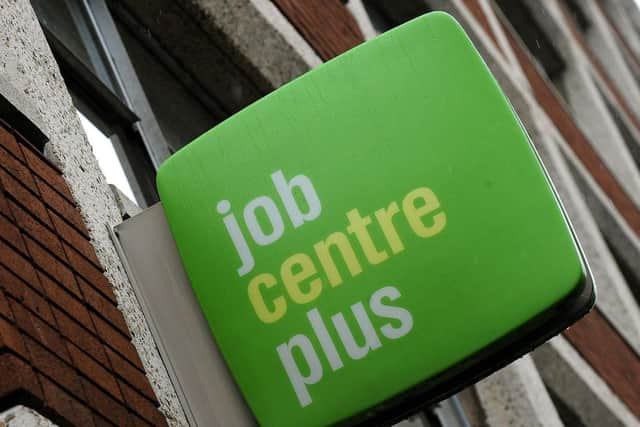Unemployment hits a four year high as firms shed jobs amid the coronaviurs crisis
and live on Freeview channel 276
The Office for National Statistics revealed the unemployment rate reached 5 per cent for the first time since early 2016 in the three months to November after another 202,000 people lost their jobs.
Figures for December also showed there were 828,000 fewer Britons on company payrolls since before the crisis struck last February as the pandemic has hammered the jobs market.
Advertisement
Hide AdAdvertisement
Hide AdThe gloomy unemployment figures come despite signs that the Government’s move to extend the furlough scheme to April has helped cushion the blow.


The number of payroll employees nudged up by 0.2% between November and December, with employment also falling at its slowest pace since March, down 88,000 at 32.5 million.
The redundancy rate hit another record high, up 168,000 between September and November to 395,000, though it dropped slightly from a peak in September.
The early recovery in vacancies seen in the summer also slowed, with around 81,000 between October and December at 578,000 – half the level of growth in the previous three months.
Advertisement
Hide AdAdvertisement
Hide AdONS head of economic statistics Sam Beckett said: “In the three months to November, on our survey data, the employment rate fell sharply again, while the unemployment rate rose to hit 5 per cent for the first time in over four years.


“The number of people saying they had been made redundant in the previous three months remains at a record high.
“Meanwhile, vacancies, which were rising in summer and early autumn, have been falling in the last couple of months.”
As a result the number of people claiming working age benefits such as Universal Credit, which includes people working with low income and hours as well as people who are not working, has risen by 3.4 per cent to 2,610,290. In the North West there were 314,550 claiming benefits, up also 3.4 per cent.
Advertisement
Hide AdAdvertisement
Hide AdIn Lancashire's Parliamentary constituencies for December, Blackpool North had 4,565 people claiming benefits, some 9.3 per cent of the population there, a figure which was up 4.3 per cent on December last year.
In Blackpool South there were 6,330 claimants, 12.9 per cent of the population and up 5.7 per cent on the same month last year. Chorley had 2,980 claimants, 4.6 per cent of the population, up 2.3 per cent on December 2019, Fylde had 2,670 claimants 5.3 per cent of the population, up 2.3 per cent.
Preston had 5,385 people claiming benefits, 8.3 per cent of the population, a figure up by 3.7 per cent on December 2019. The Ribble Valley had 2,160 claiming, 3.5 per cent of the population and up 2.2 per cent on last year.
South Ribble had 2,285 claimants, 3.8 per cent of the population and up 2.1 per cent on last year, while Wyre and Preston North had 1,830 claimants, 3.5 per cent of the population and up 2.2 per cent on December 2019.
Advertisement
Hide AdAdvertisement
Hide AdMinister for employment Mims Davies said: “These figures show many people are still facing difficult times, but our support is helping keep millions of workers on payrolls across the country.
“Whilst there is light at the end of the tunnel with jabs already in the arms of millions and the vaccine rollout gathering pace, our Plan for Jobs is helping to protect and support livelihoods, as well as create new opportunities for those who need them."
Business leaders reiterated calls to Chancellor Rishi Sunak to extend support measures further to help sectors on life support during the lockdown, such as the hospitality industry and high street.
Tej Parikh, chief economist at the Institute of Directors, said: “It is now crucial that the Job Retention Scheme and other Covid-19 economic support is extended beyond the spring to support employment as restrictions continue.
Advertisement
Hide AdAdvertisement
Hide Ad“The latest lockdown will have only added further pressure on firms with troubled balance sheets, which means more jobs are likely to be lost in the coming months.”
Matthew Percival, director of people and skills at the CBI business group, said the Chancellor must “act now”.
“The Job Retention Scheme needs to run to at least the end of June to avoid a cliff-edge,” he said.
Neil Carberry, chief executive of the Recruitment and Employment Confederation (REC), described figures showing the number of UK workers on payrolls dropped by 793,000 year-on-year last month as “disappointing if not surprising” – but added that firms began posting more job adverts in December.
Advertisement
Hide AdAdvertisement
Hide AdMr Carberry said: “The key now is turning this trend around. Rising vacancies and hours worked are a sign that this is possible.
“Firms have learned how to work through Covid and, as REC data shows, some sectors are hiring strongly.”
The REC’s job recovery tracker found 1.77 million job adverts were posted in December, which was a record for 2020.
Mr Carberry said: “We need to take action to boost the recovery – supporting businesses to retain workers and create new jobs, and underpinning the transitions people will need to make.
Advertisement
Hide AdAdvertisement
Hide Ad“Reforming the apprenticeship levy to boost skills, reducing the cost of furlough, deferring 2020 VAT repayments and reducing the jobs tax – employers’ National Insurance – would all be sensible steps. The recruitment industry is ready to help.”
Blackpool Gazette:
Thanks for reading. If you value what we do and are able to support us, a digital subscription is just £1 for your first month. Try us today by clicking here